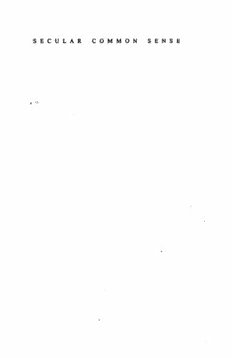
Secular common sense (Interrogating India) [Jan 01, 2001] Kesavan, Mukul PDF
Preview Secular common sense (Interrogating India) [Jan 01, 2001] Kesavan, Mukul
S E C U L A R COMMON S E N S E • Go ogle Original from Digitized by UNIVERSITYO F MICHIGAN Go ogle Original from Digitized by UNIVERSITYO F MICHIGAN SECULAR COMMON SENSE MukulI esavan ;;,' (j PENGUINB OOKS Go ogle Original from Digitized by UNIVERSITYO F MICHIGAN GRAD BL. 27lP5 .IS Penguin BooksI ndia (P) Ltd., 11 Community Centre, PanchsheeJ Park, New Delhi 110 017, India K'/7 Penguin Books Ltd., 80 Strand , London WC2R ORL, UI< Penguin Putnam Inc., 375 Hudson Street, New York, )00/ NY 10014, USA Penguin Books Australia Ltd ., Ringwood, Victoria, Australia Penguin Books Canada Ltd., 10 Alcorn Avenue, Suite 300, Toronto, Ontario, M4V 382, Canada Penguin Books (NZ) Ltd., Cnr Rosedale and Airborne Roads, Albany, Auckland , New 2.ealand First published by Penguin Books India 2001 Copyright C Mukul l(esavan 2001 All rights reserved 10 9 8 7 6 5 4 3 2 1 For sale in India only Typeset in Times New Rom11nby SORYA , New Delhi Printed at Chaman Offset Printers , New Delhi This book is sold subject to the condition that it shall not, by way of trade or otherwise , be lent, resold, hired out, or otherwise circulated without the publisher's prior written consent in any form of binding or cover other than that in which it is published and without a similar condition including this condition being imposed on the subsequent purchaser and without limiting the rights under copyright reserved above, no part of this publication may be reproduced, stored in or introduced into a retrieval system, or transmitted in any form or by any means (electronic, mechanical, photocopying, recording or otherwise), without the prior written permission of both the copyright owner and the above-mentioned publisher of this book . Go ogle Original from Digitized by UNIVERSITYO F MICHIGAN ~~ , LC--~ "1} ..Q ) ~ i:) :, To Raghu and Tar.a Go ogle Original from Digitized by UNIVERSITYO F MICHIGAN Go ogle Original from Digitized by UNIVERSITYO F MICHIGAN Origins Indians are sometimes scolded for misunderstanding secularism. They are remindedt hat secularismi n its original,w estern sense, means a commitment to a public life fenced off from religion-not an equal pandering to all religions. This is unreasonable. It is unreasonable because Indian secularism grew out of the peculiar circumstanceso f anti colonial nationalism. India isn't a Christian country where the State is trying to disentangle itself from the tentacles of a smothering, interfering church. Nor is it Ataturk's Turkey or contemporary Algeria trying to erase Go ogle Original from Digitized by UNIVERSITYO F MICHIGAN monarchy and mullahs in the name of a secular modernity. India is an unlikely subcontinental state, first made by the English, then remade by their English-speaking subjects-twice made, if you like. India was fashioned out of a process of colonial expansion and conquest that dragged on for a hundred years. The India the British made was a complicated jigsaw an Austro-Hungarian empire under more ruthless management. The post-194 7 makeover of India consisted of Congress governments tidying the partitioned Raj into a Republic: for Nehru and Patel, the task of secular nationalism was to smelt a citizenry from the ore of a heterogeneous population embedded in subjecthood. Some of this smelting had been done before lndepenc,ience by the Congress, through Gandhi's huge campaigns of civil disobedience. The discontents of a poor country were harnessed in the name of the nation against the colonial State that had, ironically, consolidated the territory that this would-be nation wished to occupy. These Congress campaigns of defiance and solidarity-Non cooperation, Civil Disobedience, Quit India- 2 Go ogle Original from Digitized by UNIVERSITYO F MICHIGAN were important not only because they helped throw the British out but because they demonstrated that India's bewilderingly plural population was capable of pwposeful collective action. If the colonial census with its columns of Khattris, Bohras, Khojas, Hussaini Brahmins and twelve different sorts of Kayasthas was a systematic unravelling of Indian society-a dissection of Mother India-the Congress's mass movements were Gandhi's great magic tricks with which he put the dismembered lady together again. Gandhi's mass movements periodically renewed the Congress's licence to speak for the nation. Admirers of Jawaharlal Nehru, Sar~ar Patel, C.R. Rajagopalachari and Subhas Chandra Bose have complained about the exaggeration of Gandhi's role in the national movement, but the truth is that from the time he led the party into the Non cooperation movement, right up to 1942, Gandhi was Merlin and the Congress was the sorcerer's apprentice. In its origins, the Congress was a self consciouslyr epresentativea ssembly of Indians from differentp arts of India. The first Congress of 1885 was inspired by the imperial 3 Go ogle Original from Digitized by UNIVERSITYO F MICHIGAN assemblage of 1877, a gathering hand-picked by the Viceroy, Lord Lytton, to represent India's census diversity. We know that this stage-managed imperial assembly prompted Surendranath Banerjea to plan a similar meeting, one designed to consolidate Indian public opinion, not to pledge fealty. The Congress never lost this sense that the nation was the sum of the sub-continent's species; that the more Parsis, Muslims, Dalits, Marwaris, Sikhs, and Christians it could count in its ranks, the better was its claim to represent the nation. The Congress, as its name suggests, saw itself as a cross between a party and a parliament (o r at least an assembly of representative Indians). Typically, till 1939, members of the Hin~u Mahasabha and the Muslim League could be members, office-bearers, even Presidents of the Congress. For the Congress, being secular meant making different types of Indians equally welcome; secularism in this context was a way of being comprehensively nationalist. Later, as the Congress's unpopularity with Muslims became inconvenient,t he party's ideological pluralism 4 Go ogle Original from Digitized by UNIVERSITYO F MICHIGAN
